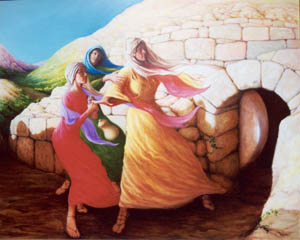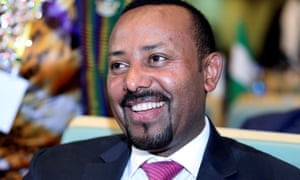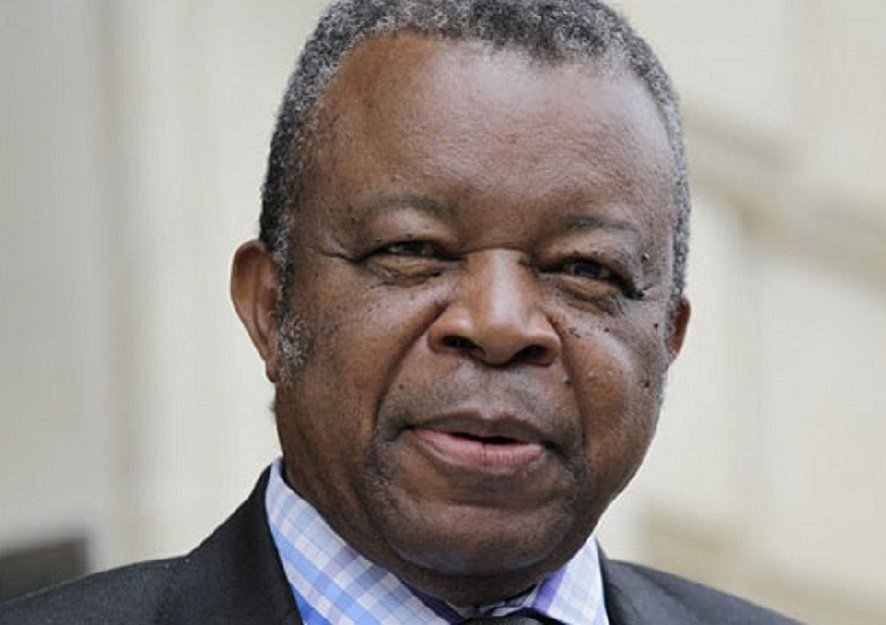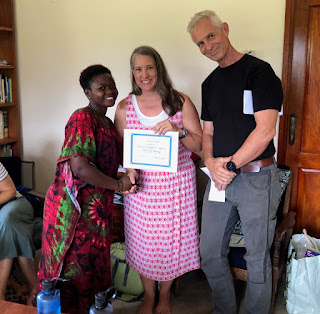Airports, internet, and layover gaps = a few minutes to pay attention to the culture wars that rage in places that don't have to expend energy on surviving floods or malaria or political oppression. So this morning I had coffee with two very disparate experiences: reading my daily Bible reading which happened to be Mark 16, and listening to the audio (that has raised a little firestorm) of a prominent evangelical conservative male Bible teacher making fun of a very widely respected evangelical woman Bible teacher named Beth Moore. Most women I know have been part of a Beth Moore Bible study at some time or another. She is a prolific author and speaker, but three men who appeared to be on stage at a convention discounted her ministry on the basis of their interpretation of the Bible as forbidding women from preaching. I am sure most people heard about this days ago . . . and everything worth saying has been said. But the juxtaposition of these two passages, from the Gospel and from the news, was so startling, allow me (Jennifer) an observation.


In Mark 16, the pivotal moment of history has just occurred. Jesus has overcome death. Crucified, dead, and buried on Friday, it is now Sunday morning just after dawn, and three women named Mary Magdalene, Mary the mother of James, and Salome have come to the tomb. They had delayed applying embalming spices around his corpse due to strict observance of the Sabbath, so now their mind is on how they will remove the massive stone sealing the burial cave's entrance. Instead they find the door open, the cave empty except for a young man in a long white robe who gives them an angelic order from God: "Jesus of Nazareth is not here, he is risen! Go, tell his disciples--and Peter . . ". If the Gospel is: Jesus died and overcame sin and death and now you can follow Him and receive the resurrection life . . . then the first humans instructed to speak this Gospel were three women. The angel did not say, you pesky busy-body women thinking you can usurp the chosen disciples with your feminist ideas, go home. The angel said, go tell. Go to your colleagues, your friends, bear witness. Live your lives as a testimony. You were here to serve in a humble way with the very physical, tangible, messiness of grief and decay. Continue in that humility but speak the truth of what you have seen.
Perhaps this hits me, because it is my life. I am up to my elbows in scabies and pus on a daily basis, and believe the call of Jesus to touch, to heal, to grieve, to pray, and to speak words of truth. For my particular church background, missionary doctor is an acceptable female vocation. I'm thankful for that. It's not seen as a power position, and it isn't one.
We all have cultures. No one interprets the Bible from a universal out-of-the-earth perspective. For some that is a small slice of history that looks a certain way in terms of power structures between men and women, white and color, global north and south, wealthy 1% and everyone else. And depending on where and when you were born, certain verses we assign to "limited to that culture and time" and others we broaden to "applicable always". I don't know, but I doubt the men on that stage had tassels on their clothes, or had stoned a rebellious son, or had given their coat away if asked, or sold all they had and gave to the poor, or had plucked out an eye if they glanced at pornography. Yet all those things are literally in the Hebrew and Greek. As 21rst century speakers of English, we have to study, interpret, pray, and apply. The Bible is true, and all of it has something to say to us. Read the Bible as poetry, as story, as theological treatise, as prophecy, as history. Grapple with the implications. All of us need to do that. All of us need the uncomfortable truths. I am blind to the beauty and invitation of holiness on a thousand levels, self-righteous and self-protective. All of us need to wrestle with God as Jacob did, and all of us come away limping.
Jesus did not mince words, but most of his anger was directed at those who thought they knew best, who wanted to fit everyone else into their boxes, who acted without charity to ensure their own power. For those rescued from lives of thievery, demon-possession, fruitless toil, social isolation, prostitution, disability . . . his words were tender. But in both cases, his words were love. Tough love to shake us out of our self-satisfied pride; tender love to heal our bruised souls. Because Jesus cares about the men on the stage and the woman being scorned. Jesus loves them all, and us too, and to some degree we all are part-pharisee and part-prostitute, we all think better of ourselves than we ought and worse of our selves than God does.
Thank you, Beth Moore, for your gracious response. Let's focus on the big picture. Another friend sent this link this week, a commentary on how the Spirit is moving through diverse cultures all around us. Let's not try to tear each other down, but rather acknowledge that we're ALL going to be pretty surprised in Heaven. What would the world look like if we all took seriously doing justice, loving mercy, and walking humbly with our God?
















































